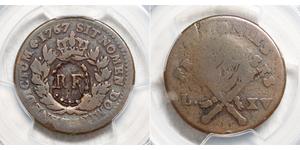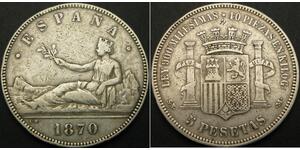1/4 Escalin Guadeloupe Bronze
1767-A, Guadeloupe (French Colony). 1/4 Escalin (3 Sou 9 Deniers) Coin
Mint Year: 1767
Mint Place: Paris
References: KM-1.
Denomination: 1/4 Escalin (3 Sou 9 Deniers)
Material: Bronze
Weight: 12.15gm
Diameter:
29mm
Guadeloupe (Guadeloupean Creole French: Gwadloup, IPA: [ɡwadlup]) is an archipelago and overseas department and region of France in the Caribbean. It consists of six inhabited islands—Basse-Terre, Grande-Terre, Marie-Galante, La Désirade, and the two inhabited Îles des Saintes—as well as many uninhabited islands and outcroppings. It is south of Antigua and Barbuda and Montserrat and north of the Commonwealth of Dominica. The region’s capital city is Basse-Terre, located on the southern west coast of Basse-Terre Island; however, the most populous city is Les Abymes and the main centre of business is neighbouring Pointe-à-Pitre, both located on Grande-Terre Island. It had a population of 384,239 in 2019.
Louis XVI or Louis-Auguste de France (Versailles, 23 August 1754 – Paris, 21 January 1793) ruled as King of France and of Navarre from 1774 until 1791, and then as King of the French from 1791 to 1793. Suspended and arrested during the Insurrection of 10 August, he was tried by the National Convention, found guilty of treason, and executed by guillotine on 21 January 1793. He was the only king of France to be executed.
Although Louis was beloved at first, his indecisiveness and conservatism led some elements of the people of France to eventually view him as a symbol of the perceived tyranny of the Ancien Régime. After the abolition of the monarchy in 1793, the new republican government gave him the surname Capet, a reference to the nickname of Hugh Capet, founder of the Capetian dynasty, which the revolutionaries wrongly interpreted as a family name. He was also informally nicknamed Louis le Dernier (Louis the Last), a derisive use of the traditional nicknaming of French kings. Today, historians and French people in general have a more nuanced view of Louis XVI, who is seen as an honest man with good intentions, but who was probably unfit for the herculean task of reforming the monarchy, and who was used as a scapegoat by the revolutionaries.
(3205 X 1500 pixels, file size: ~758K)
Posted by: anonymous 2023-10-30
1767-A, Guadeloupe (French Colony). 1/4 Escalin (3 Sou 9 Deniers) Coin. PCGS VG-08! Mint Year: 1767 Mint Place: Paris References: KM-1. Denomination: 1/4 Escalin (3 Sou 9 Deniers) Condition: Certified and graded by PCGS as VG-08, with a strong "RF" countermark, which allowed the ...
(1537 X 743 pixels, file size: ~214K)
Posted by: anonymous 2020-05-20
1793, French West Indies, Guadeloupe. Cu 3 Sols & 9 Deniers Coin. PCGS VG-08/VF! Mint years: 1767 (host coin) / 1793 (countermark) Mint Place: Paris (host coin) / Guadeloupe (countermark) Condition: Certified and graded by PCGS as VG08, with a VF countermark! Denomination: 12 Deniers ( ...
(1445 X 743 pixels, file size: ~111K)
Posted by: anonymous 2015-05-02
1793,FRENCH COLONIES. Guadeloupe. 3 Sols 9 Deniers (1/4 Escalin), ND (1793). NGC VF Details Improperly Cleaned.KM-1; VG-1059; Gadoury/Cousine-1.
(900 X 453 pixels, file size: ~68K)
Posted by: anonymous 2015-11-25
Französische Kolonien-Guadeloupe Cu 3 Sous 9 Deniers 1767, mit Gegenstempel RF (1793). K.M. 1. Sehr schön
(1005 X 497 pixels, file size: ~94K)
Posted by: anonymous 2015-02-20
GUADELOUPE, as French Colonial and Occupation, copper nine deniers 1767A, host coin, (KM.1), countermarked RF in oval for Guadeloupe. Fine/good very fine.
5 Peseta First Spanish Republic (1873 - 1874) Silver
group has 38 coins / 33 prices
⇑













-300-150-DTwKX9ISLbYAAAFanYlMgKms.jpg)







